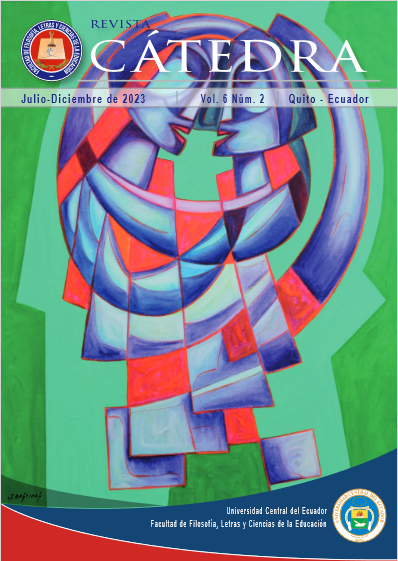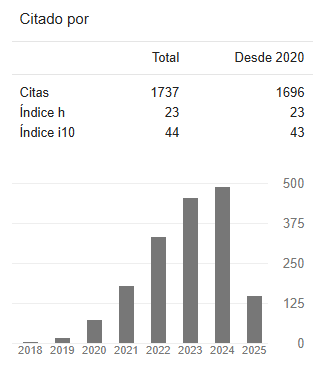Feminism in Equatorial Guinean literature: an approach to the socio-educational study of the novel Ekomo by María Nsue Angüe
DOI:
https://doi.org/10.29166/catedra.v6i2.4353Keywords:
Education, emancipation, feminism, literature, woman, novelAbstract
The purpose of this article is to study feminist thought in Equatoguinean literature, based on an approach to the socio-educational study of the novel Ekomo by María Nsue Angüe, the first novel written by a woman in the history of Equatoguinean literature. The research problem focuses on the lack of academic dissemination of the study of feminist thought in the novel Ekomo within the literature of Equatoguinean literature in particular and in the literature of the Hispanic world in general. However, it is important to study the feminist perspective of this novel to know its socio-educational content in order to promote socio-cultural changes that allow a more equitable and inclusive society. The method used for this analysis is descriptive, based on qualitative methodology that has allowed us to analyze the data obtained from the questionnaire conducted, and whose main results show that the novel Ekomo is feminist, because it reflects the inconsistencies of male discourses, as well as the injustices and asymmetries of gender relations in Equatoguinean society.
Existing research on this novel does not focus on pointing it out as a feminist work because of its socio-educational component for the Equatoguinean society. Therefore, the solution we propose to the problem is to study this novel as feminist because it helps to claim from literature the abandonment of aberrant cultural practices. Therefore, it is essential that a work of this nature be more widely disseminated from the academic field so that its pedagogical content is known.
Downloads
References
Alcojor, A. M. (2020). María Nsue Angüe, referente de la literatura ecuatogiuneana. Recuperado el 27 de diciembre de 2022 de, https://porfinenafrica.com/2020/02/maria-nsue-literatura-ecuatogiuneana/
Álvarez Méndez, N. (2010). Palabras desencadenadas: aproximación a la teoría literaria postcolonial y a laescritura hispano-negroafricana. Zaragoza: Prensas Universitarias de Zaragoza.
Beatriz Celaya, C. (2011). Fricciones culturales en la novela afro-hispana Ekomo de María Nsue Angüe. Afro-Hispanic Review. Volume 30, Number 2 , pp. 41-58.
Bituga Nchama, P. B. (2021). De lo privado a lo público: Estudio de las relaciones de género en el sistema patriarcal Fang de Guinea Ecuatorial. Asparkía. Investigació Feminista, (38), 217-233.
Bituga Nchama, P. B., Ondo Mibuy, R. N., y Osá Bindang, P. E. (2022). La presencia del pensamiento feminista en la sociedad y la literatura guineoecuatorianas:una lucha por la emancipación de la mujer. QVR, 59-60, 136-158, https://quovadisromania.univie.ac.at/.
Bituga-Nchama, P. B. (2020). Los estereotipos de género en la construcción de la mujer fang: Una educación patriarcal para la sumisión. Revista Cátedra, 3 (3), 143-160.
Dos Santos, M. (2011). La lectura feminista en la literatura: El caso de Delmira Agustini. Estudios de la literatura (Alicante), 2( (7), 233-251.
Facio, A., y Fries, L. (1999). Feminismo, género y patriarcado, en Alda Facio y Lorena Fries (eds.), Género y Derecho. Santiago de Chile: La Morada/ Lom/ American University.
Fe, M. (1996). Notas sobre literatura femenina. Política y Cultura, (6), 169-171.
Hidalgo López, J. A. (1993). La novela en Guinea ecuatorial. África 2000. Malabo: Centro Cultural Hispano-Guineano, n.° 20, 42-44.
Keffa, D. J. (2023). Entre marginalización y opresión: el rostro de la mujer ecuatoguineana bajo el patriarcado fang a través de la obra Ekomo de María Nsue Angüe. Álabe 27, DOI: 10.25115/alabe27.8314.
Mbaré Ngom, F. (2003). Literatura Africana de expresión castellana. Cuadernos centros de estudios Africanos, n°. 3, enero, Documentos Asodegue, pp. 111-135.
Minsongui Dieudonné, M. (1997). Mujer y creación literaria en Guinea Ecuatorial. Epos, 209-218.
Montero, J. (2006). Feminismo: un movimiento crítico. Intervención Psicosocial. Vol. 15, N.° 2, 167-180.
Ndongo-Bidyogo, D. (1984). Antología de la literatura guineana. Madrid: Editora Nacional.
Nsang Ovono, C. (2018). Las formas del matrimonio bantú en Guinea Ecuatorial. Madrid: Dykinson, S.L.
Nsue Angüe, M. (1985). Ekomo. Madrid: UNED.
Nsue Mibuy, R. E. (2005). Historia de Guinea Ecuatorial. Período precolonial.
Otabel Mewolo, J.-D. (2003). Literatura de Guinea Ecuatorial. Sujeto cultural y dictadura: El personaje del abogado en Los Poderes de la Tempestad de Donato Ndongo Bidyogo. Epos. XIX , 119-128.
Pérez Armiño, L. (2018). Y el sujeto se hizo verbo (aunque siempre fue objeto). La mujer fang en Guinea Ecuatorial y el impacto colonial. Anales del Museo Nacional de Antropología, XX. Madrid: Ministerio de Educación, Cultura y Deporte, 30-59.
Ramos-Galarza, C. A. (2020). Los Alcances de una investigación. Revista CienciAmérica 2020, 9(3) , https://doi.org/10.33210/ca.v9i3.336.
Vacca, L., y Coppolecchia, F. (2012). Una crítica feminista al derecho a partir de la noción de biopoder de Foucault. Páginas de Filosofía, Año XIII, Nº 16, pp. 60-75.
Varela, N. (2018). Feminismo para principiantes. Barcelona: Penguin Random House Grupo Editorial, S. A. U.
Vicente Serrano, P. (1991). Aproximación a la polémica sobre la "literatura de mujeres". Acciones e investigaciones sociales, Núm. 1, 69-80.
Vivero Marín, C. E. (2009). El género en la teoría literaria. Géneros. Revista de investigación y divulgación sobre los estudios de género. Número 4, pp-67-74.
Downloads
Published
Versions
- 2023-07-26 (2)
- 2023-07-25 (1)









